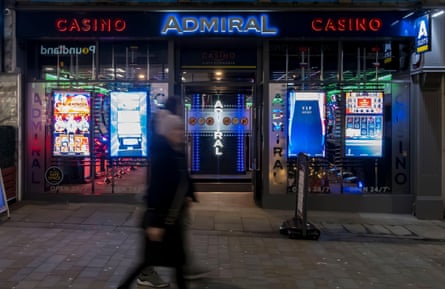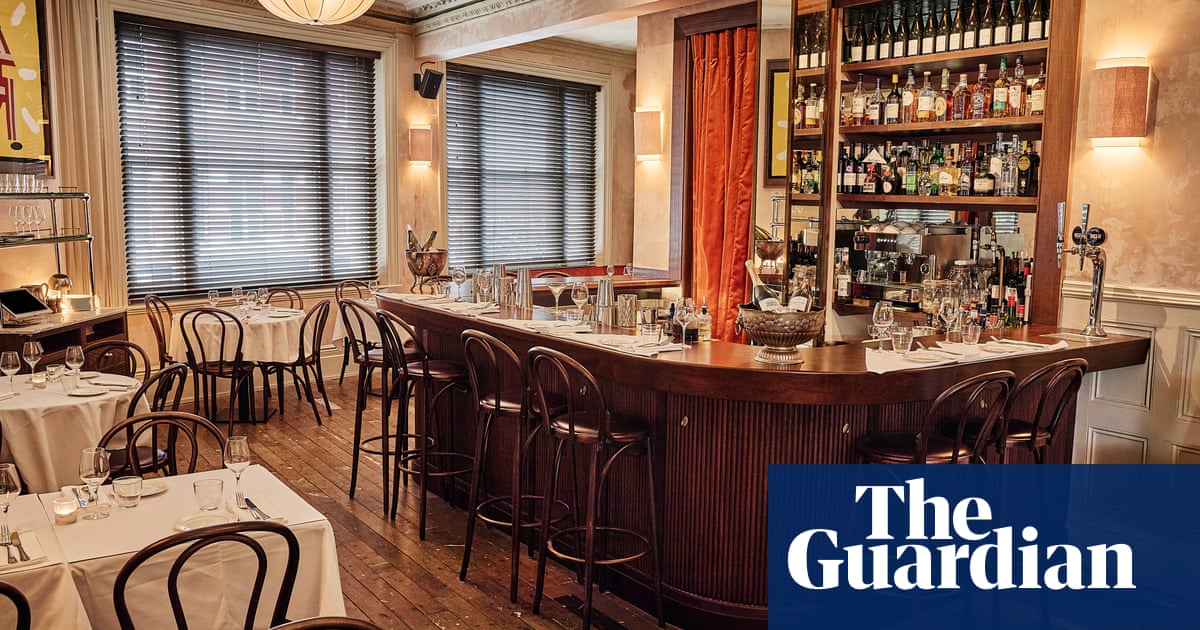It is almost 2am in Peterborough and a handful of punters are wordlessly feeding their money into the machines at Merkur Slots.
A fragment of a song, the lyric “nothing to lose”, drifts through the shop as their funds rapidly evaporate. Closing time is fast approaching, but that does not mean the end of the gambling.
Five minutes’ walk down Lincoln Road, a near-deserted street lit by the neon signs of shuttered vape shops and fast food outlets, sit two more Merkurs, this time with 24-hour licences.
Even in the small hours, many of the roughly 20 machines in each shop are doing a brisk trade.
Staff provide regular doses of caffeine and sugar, ferrying free coffee, chocolate bars and Haribo sweets to customers as they play their way through games such as Shaun the Leprechaun and Rainbow Riches. Some Merkur venues even have compact pizza ovens, to keep the punters playing.
Zoom out to national level and this picture – of towns and cities pockmarked by 24/7 slot shops – is replicated time and again.
Welcome to the business of “adult gaming centres” (AGCs) – the under-scrutinised network of slot machine arcades that are expanding rapidly on Britain’s high streets, even as their more traditional cousins, bookmakers, retreat.
In Great Britain, the number of AGCs rose by 7% to 1,451 between 2022 and 2024, figures from the Gambling Commission show, reversing a longer-term decline since 2010, as gambling shifted online.
Merkur alone has opened 100 new venues since 2020 and now has more than 230 in the UK, each packed with machines of varying types.
Including Merkur’s rivals, there are now more than 14,200 £2-a-spin slot machines in Britain, each making £32,600 annually from customers, according to Gambling Commission figures. On that basis, every terminal is sucking a sum close to Peterborough’s average salary out of the fragile local economy.
That adds up to £463m across the country and more than £500m when factoring in less popular £1-a-spin machines too.
The AGC renaissance has given addiction professionals cause for alarm. Slot machines, digital and in-person, have consistently been rated among the highest-risk products for problem gambling, including in surveys conducted last year for the Gambling Commission by experts at the University of Glasgow.
“They are designed and built for prolonged play and harm is the inevitable consequence,” says Dr Matt Gaskell, a consultant psychologist and clinical leader at the NHS Northern Gambling Service. “Increasing their availability on the high street is of massive concern.”
Whatever fears public health professionals may express, nobody has been able to stop the AGC juggernaut, at least for the time being.
For, as the Guardian reveals today, the industry has deployed a host of highly effective tactics – ranging from legitimate legal firepower to apparent dishonesty – to sweep aside all opposition.

Spinners and losers
The sign above the door at 551 Lincoln Road advertised a Chinese takeaway called the New Golden Dragon, until Merkur decided that three venues in one small city was not enough.
Peterborough’s newest Merkur received the green light in 2024 after a lengthy planning and licensing approval process that appears to have involved, at the very least, a flexible approach to accuracy.
Appearing before a council committee in June 2024, a representative of the company sought to allay any concerns about Merkur’s plan to convert the store into an AGC.
“This is not a betting shop,” she told the committee.
AGCs, she said, were a very different prospect to betting shops because they were mostly patronised by women, while average stakes were as little as 30p. Nor did they offer, as bookies did, high-octane “fixed-odds betting terminals” (FOBTs) that allow customers to stake up to £50 a spin.
There were, however, problems with that testimony. The maximum FOBT stake hasn’t been £50 since 2019, when the government cut it to £2, in line with machines in Merkur shops.
That change has helped fuel the AGC boom as punters, deprived of the chance to use high-stakes machines in their local bookmakers, flocked to slot shops instead.
Merkur’s representative, who the Guardian has chosen not to name, also told councillors that AGCs were places where people came to have “a game of bingo principally”.
This claim, too, appears to be in question.
Merkur shops do offer bingo games, typically via iPad-style tablets. But this appears to be part of a tactic commonly used to exploit a weakness in the regulatory system and increase revenues.
Under Gambling Commission rules, the number of £2 (category B) machines allowed in a gaming centre is limited to one quarter of the number of their lower-intensity £1-a-spin machines (category C). According to the government’s white paper on gambling reform published last year, some companies have found an ingenious way around this.
A tablet technically counts as a category C machine. This means that placing a rack of tablets in a corner allows companies to pack the remainder of the shop with more higher-stakes machines. In multiple visits to Merkur shops, the Guardian has never seen a bingo tablet in use.

Merkur says its representative’s comments to Peterborough’s licensing committee have been “taken out of context”, without explaining how.
A spokesperson adds: “[The company] categorically denies making any dishonest or deliberately misleading representations to any local authority planning or licensing committee.”
One former Merkur staff member says they believe the company has also sometimes been less than forthcoming with the local authorities about criminal damage in its shops, mindful of future planning and licensing battles.
The former employee, who asked not to be named, says Merkur spends huge sums each year on replacing or repairing machines damaged by customers who lose their temper after “playing to extinction” – the industry term for losing all your money.
“They don’t go after anyone for criminal damage even though it costs a fortune. When they apply for licences, they want to be able to stand up and say their sites are trouble free,” the former employee says.
A Merkur spokesperson says it is “entirely untrue that Merker has a policy or practice of avoiding the reporting of criminal damage to the police. Such a suggestion is both inaccurate and unfair.”
In fact, Merkur does not need to burnish the image of its shops, for it also has the entire planning and licensing system on its side.
The house always wins
Like Peterborough, the London borough of Brent is saturated with slot shops, including seven within a few hundred metres of one another. Like Peterborough, it also has relatively high levels of economic deprivation.
Around Harlesden and Kensal Green ward, which includes some of Brent’s “trouble spots”, more and more slot shops have sprung up, even in the face of furious objections from local residents.
On the latest one, residents have daubed graffiti saying: “Ban gambling in deprived areas”.
after newsletter promotion

Councillor Matt Kelcher, the chair of the planning committee, does not condone the defacing of private property but understands the sentiment behind it.
“It’s that frustration people have of not being in control of their neighbourhood and their lives. People have no say of what’s happening on their own high streets,” he says.
Time and again, he says, councillors, dozens of locals and even the police objected to a new AGC, only to be outlasted and outspent by companies with a steely resolve to expand and deep pockets.
Merkur is owned by Germany’s billionaire Gauselmann gaming dynasty, while its main rival Admiral Slots is part of Austria’s Novomatic, providing their UK subsidiaries with serious financial heft.
“There’s one of us objecting to it and then the AGC brings two KCs and a solicitor,” says Kelcher.
Analysis of planning documents by the Guardian reveals that Merkur has routinely been able to submit hundreds of pages of supporting documents to under-resourced local councils.

These include submissions from leading planning consultants and even reconnaissance reports from a firm of former police officers paid to stake out nearby AGCs and opine on whether they are associated with antisocial behaviour.
In the examples seen by the Guardian, the same glowing reports emerge each time.
Ultimately, gambling operators have the resources to keep going until they get what they want, says Kelcher. When they meet a particularly resistant local authority, they appeal to central government’s Planning Inspectorate.
According to a freedom of information request by the Guardian, Merkur and its Cashino brand appealed to the Planning Inspectorate 32 times between October 2020 and June 2024, succeeding in about two-thirds of cases.
The licensing system, which focuses on how a business must operate once it has planning permission, is even kinder.
Under the Gambling Act 2005, Labour’s landmark liberalisation of gambling laws that successive governments have begun to roll back, the Gambling Commission and local authorities must “aim to permit” gambling, meaning they are legally bound to err on the side of permissiveness.
Kelcher’s fellow councillor, Mili Patel, says: “I was in a licensing committee for a Merkur application for three hours. The whole thing becomes a farce because we know it will go through and they know it will go through.”
Brent council is at the forefront of a nascent fightback, which now has the backing of 30 local authorities and Greater Manchester’s mayor, Andy Burnham.
They have put forward a six-step plan including the abolition of the “aim to permit” mandate and putting AGCs into the same category as betting shops for planning purposes, so that councils can consider the overall volume of gambling activity.
So far, the government has made vague noises about giving councils more power over planning decisions.
If critics of AGCs are to win further concessions, they will have to point to real evidence of harm in their communities.

The human cost
That evidence is starting to mount. In February, Merkur was fined almost £100,000 by the gambling regulator after the Guardian revealed how staff allegedly exploited a vulnerable cancer patient.
Now, sources say, the same Stockport branch is under investigation by the regulator after a customer complained they had deposited almost £9,000, and lost more than £2,000, without staff intervening to check he was in control of his gambling.
Part of the complaint alleges that the branch was “single-staffed”, something that high street betting firms typically try to avoid, for the safety of employees and customers.
When it came time for that sole employee to cash up, the customer alleges, single staffing meant that he had to be shut inside for security reasons leaving him literally locked in the grip of gambling.
Reviews on the employment website Glassdoor by people who said they worked for Merkur repeatedly highlight single staffing as a concern.
Merkur has confirmed it is cooperating with a Gambling Commission review of the customer’s claims but adds that a full internal inquiry found the allegations are “inconsistent with the investigation’s findings”.
Merkur says: “We take our responsibilities as a licensed operator extremely seriously, particularly in relation to planning compliance, safer gambling, and public safety.”
In Peterborough, its shops appear sufficiently well resourced to cope with the steady flow of gamblers who were still there in the small hours, including bouncers poised to snuff out any trouble.
Outside one branch, two punters are divided over whether AGCs are doing any harm.
Monica, 28, from Lithuania, says it is the “best place in the world”.
“Everywhere else is closed,” she adds, gesturing unsteadily at the high street.
“Here you can spend your money and have a good time,” she says, although she does admit to having lost £1,300 at the Admiral Slots in the town centre, one of six gambling establishments in a stretch of nine shopfronts.
A 51-year-old man, who declines to give his name, disagrees. Merkur is the “worst” place in the world, he says, adding: “They make you lose all your money.”
Inside, another song serenades punters over the PA: “I got a feeling that tonight’s gonna be a good, good night” goes the lyric, as their credit on the machines steadily counts down to zero.

 3 hours ago
6
3 hours ago
6













































